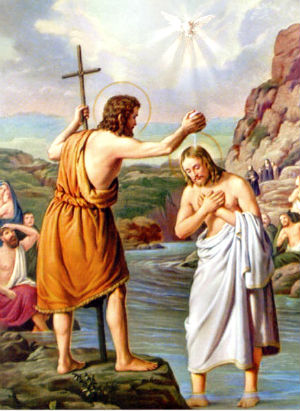BAPTISM OF OUR LORD
First Reading: Isaiah 42:1-4, 6-7
Responsorial Psalm: Psalms 29:1-4, 3, 9-10
Second Reading: Acts 10:34-38
Gospel: Mark 1:7-11
As Christmas ends today, we begin to focus on the public ministry of Jesus. The baptism is His first public appearance as an adult.
The baptism of Jesus in the river Jordan is a great mystery. How can we enter into this great mystery? Jesus approached John the Baptist and asked him to baptize Him.
John the Baptist invited people to prepare for the imminent coming of the Messiah. The preaching of John the Baptist made a deep and extraordinary impression on the people that they started to make their way to the Jordan to be baptized by him. The baptism of John was a baptism of repentance. When people come to John to be baptized, it is because they acknowledge their sins and their baptism implies a confession of guilt and a plea for forgiveness in order to turn a new leaf and leave the life of sin behind.
John’s baptism includes the confession of sins cf. Mark 1: 5. The goal is to leave a life of sin behind and live a righteous life. It also includes immersion into the waters. Immersion into the water is a symbol of death and resurrection. It recalls first of all, the death symbolism of annihilating destructive power of the waters. Remember the flood that destroyed Noah’s world. The ancients perceived the ocean as a permanent threat to the cosmos, the world and can submerge all life even without warning. Modern times have seen the event of tsunamis that submerged peoples in their hundreds and displaced thousands, destroying and washing away their homes.
But the flowing water is also a symbol of life. Great rivers like the Nile in Egypt, the Euphrates in present day Turkey, Indus river in India,
River Niger and River Benue are great givers of life. Ancient great civilizations arose around great rivers. They are a source of life for their surrounding regions. Immersion into water therefore is all about dying to something i.e sin and the old self and rising again, beginning anew. Hence it is about death and resurrection. That is why baptism is a rebirth, to be born again.
We have said that the baptism of John involves confession of sins and putting off the old failed self to receive a new one. Here comes the important question. Is this something Christ could do? How could He confess sins? How could He die to His old self in order to start a new one? These are questions we cannot avoid asking. This is the point of the debate between John the Baptist and Jesus in the Gospel today. John said to Jesus, “I need to be baptized by you” and Jesus replied, “let it be so now, for thus it is fitting to fulfil all righteousness.”

Imagine for a moment, Jesus standing among the tens or perhaps hundreds of people waiting to be baptized along the bank of Jordan like a penitent. For early Christians, the thought that their Lord had Himself undergone baptism (John’s baptism which is a baptism of repentance) would have been disturbing, embarrassing and even scandalous. Could the Immaculate Lamb, the altogether Holy Jesus, really have submitted to an act of purification? Could He have admitted by implication that He too was part of unclean, guilty, sinful humankind? It says a great deal for their honesty that they did not attempt a cover-up, but left this seemingly controversial episode to stand in the Gospel tradition.
The Fathers of the Church came to understand it as an expression of the stooping down of God in loving-kindness to man, His condescension to the level of this world. Looking at the baptism of Jesus in the light of His Cross and Resurrection, the Fathers of the Church understood exactly what happened. Jesus loaded Himself with the guilt of all humankind and bore it down into the depth of Jordan. In this sense, the paradox of the Lord’s Baptism like the Cross, reveals the extent of God’s love for humankind. He began His public ministry by stepping into the place of sinners. His baptism is an expression of solidarity with man who has incurred guilt and yearn for righteousness. By His baptism, He symbolically took our place and our destiny. He becomes the true Jonah who said to the crew of the ship, “take me and throw me into the sea.” His baptism anticipates His acceptance of death for us and our blessed resurrection with Him.
The more important question to ask as we celebrate the baptism of Our Lord is, “what is the meaning of His baptism for us?” This is very important for us because in it we find the meaning of our own baptism and our identity as sons and daughters of God in whom He is well pleased. Jesus did not enter the River Jordan to be sanctified but to sanctify the waters of baptism and make it the wellspring of salvation. He did not accept baptism because he did not know who He is but to reveal His identity and restore our true identity. Because Jesus identified with us at baptism, it is also at baptism that we receive our full identification. St Paul will later use this connection to develop his theology of baptism in Romans chapter 6.
To conclude, we can say that the liturgy today provides us a good opportunity to recall with great joy, our own baptism by which is symbolized our dying to sin and rising to new life – a life that will give glory and honor to God, so that when God looks at us, He can say, ‘this is my beloved son, or this is my beloved daughter in whom I am well pleased.’ Indeed, when we were baptized, the Holy Spirit descended upon us and the voice of the Father came to us, “you are my beloved Son in whom I am well pleased.”
He adopted us as His very own children.
It is from His identity as the beloved of the Father that Christ’s mission and work of salvation flows. Jesus prayed because He is the beloved son of the Father, He forgave sins because He is the beloved son of the Father, He obeyed the Father even unto death because He is the beloved son of the Father. He accepted to suffer and die because He is the beloved son of the Father. You are the beloved son/ daughter of the Father. How does that govern your life? To become sons and daughters of the Father in whom He is well pleased, we must like Jesus, live without sin, we must live the life of prayer, we must love God and love our neighbors and obey the commandments of God.
Happy Sunday

Fr. Chidi Onwuka
